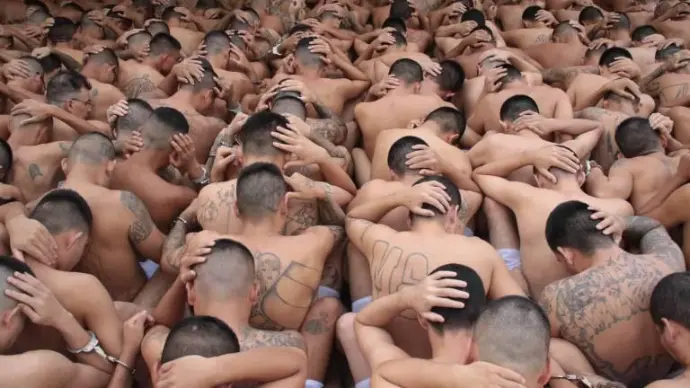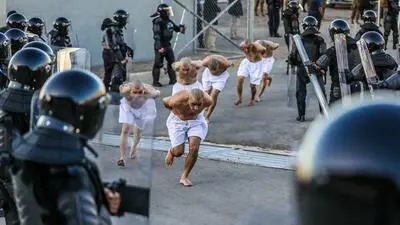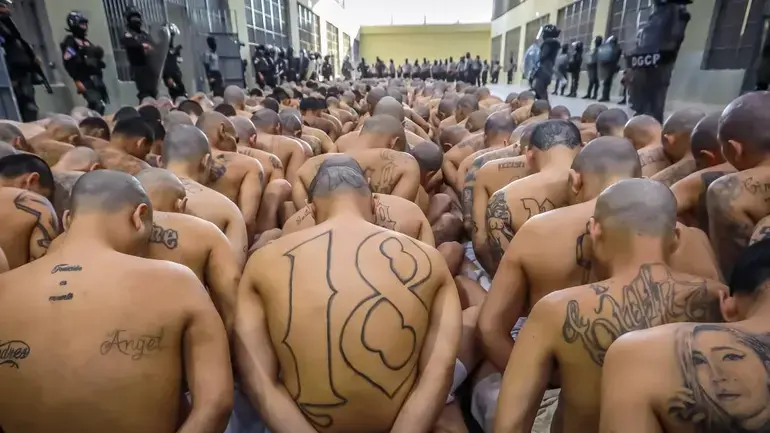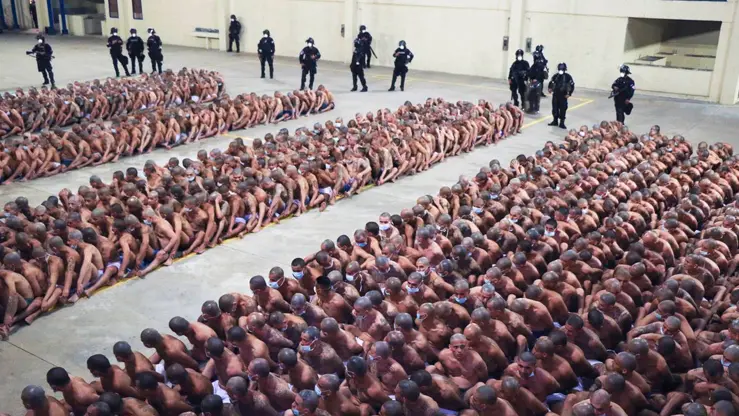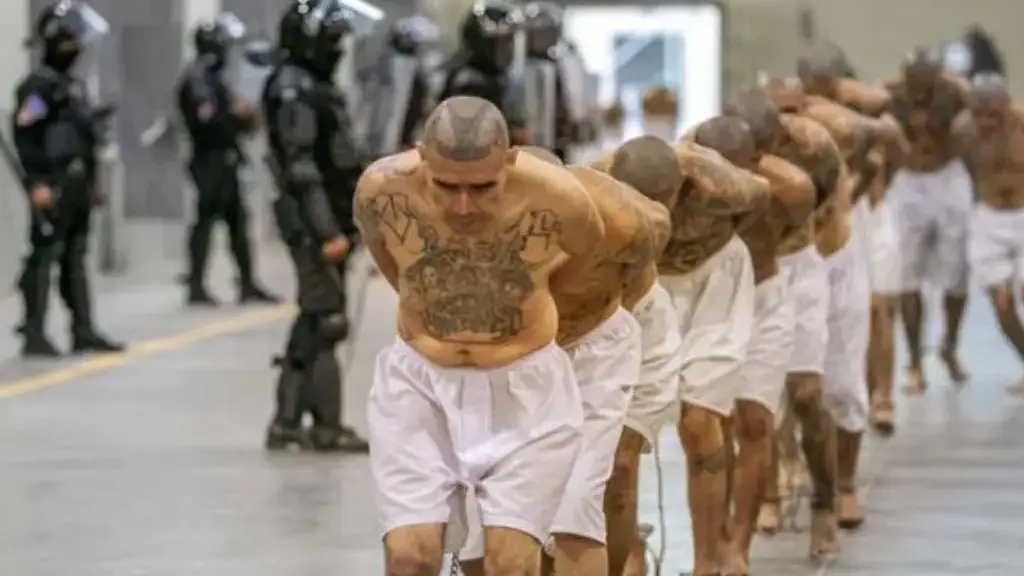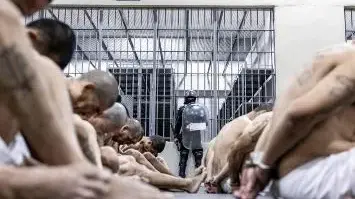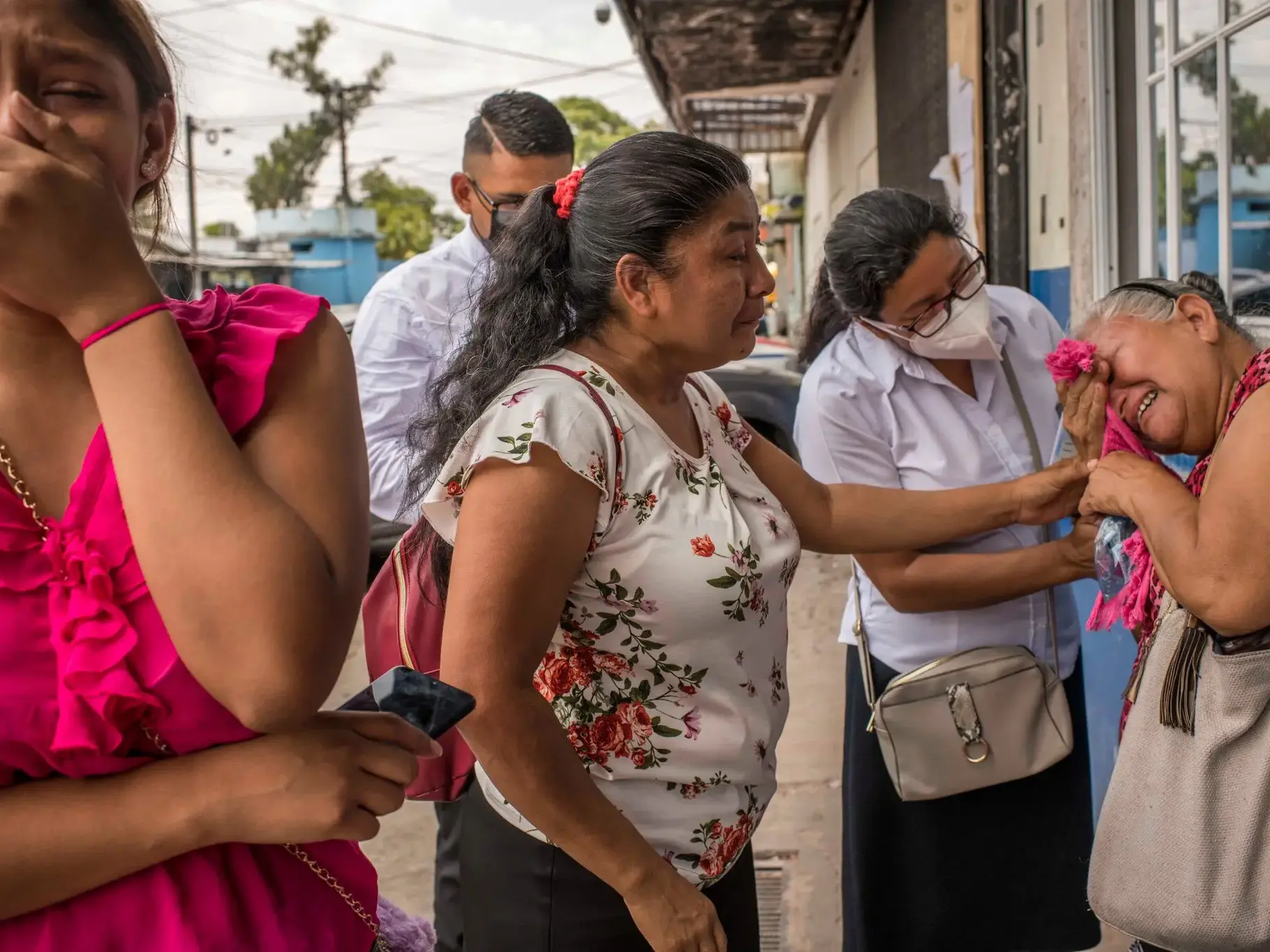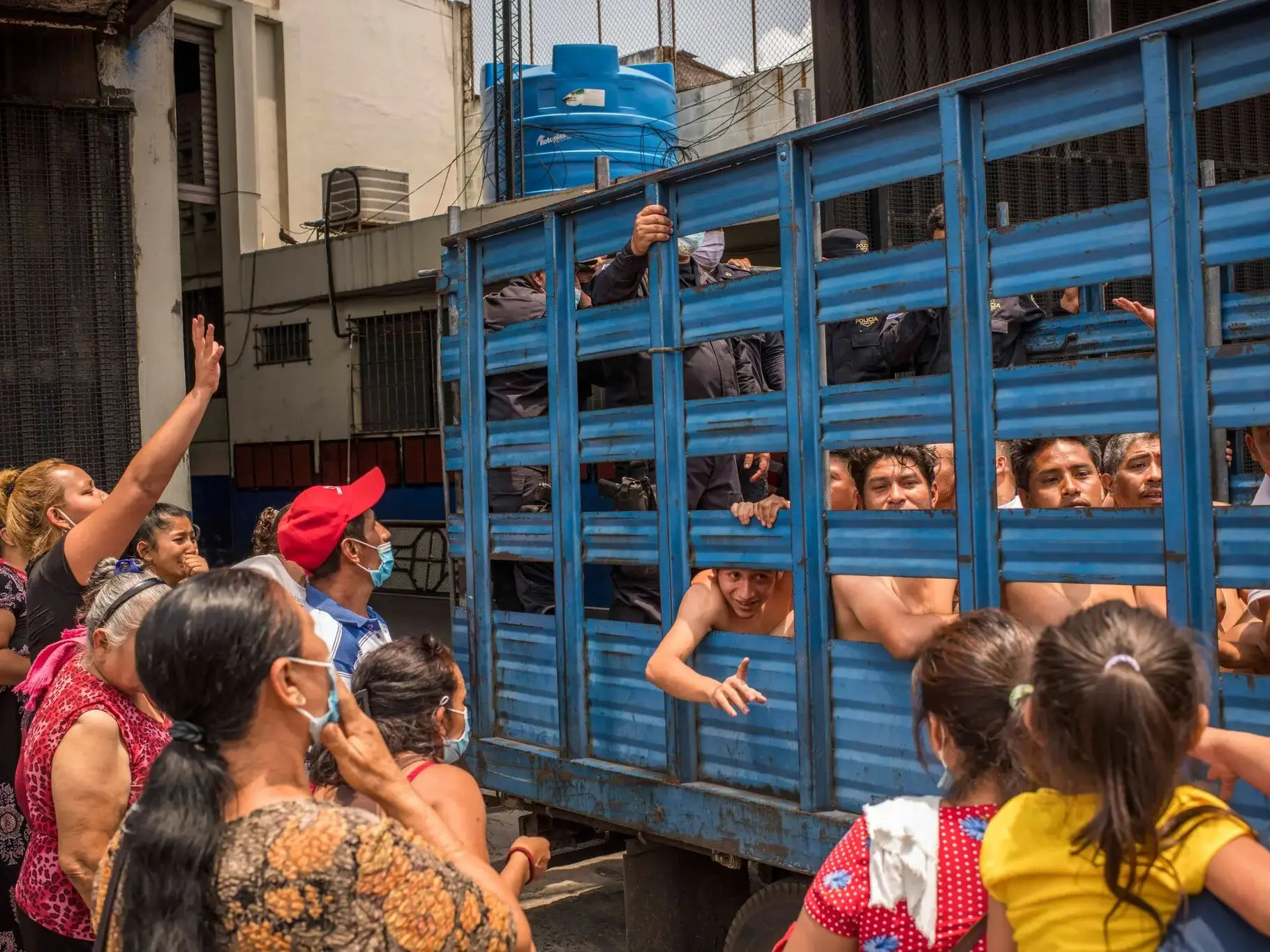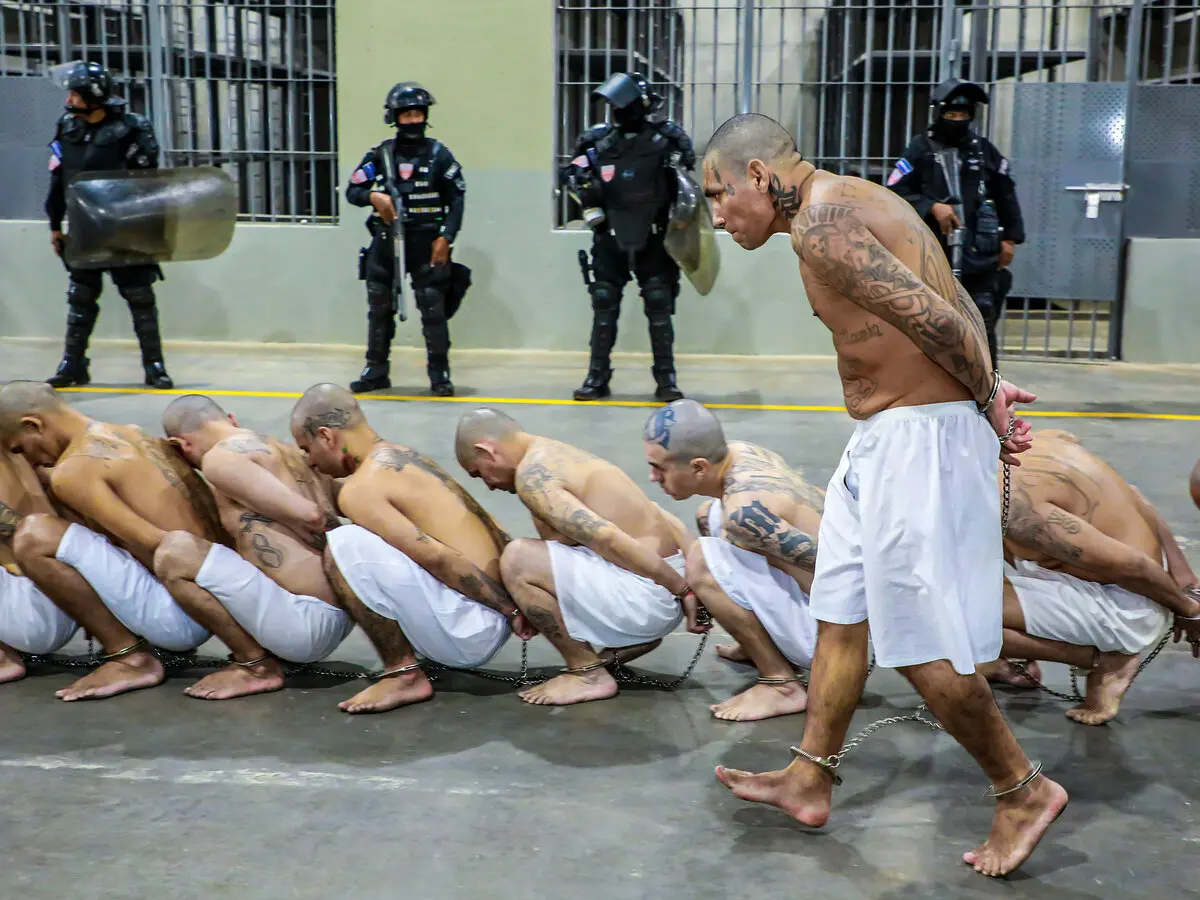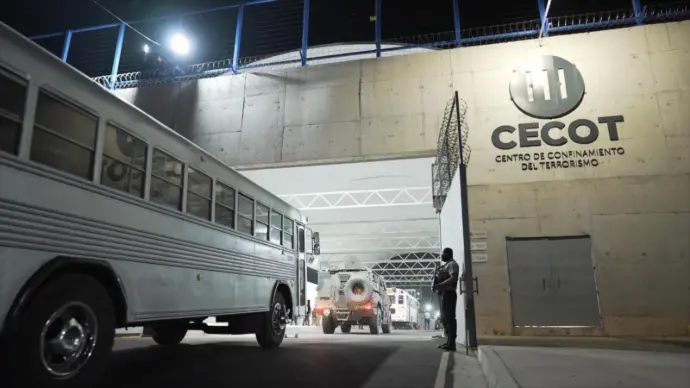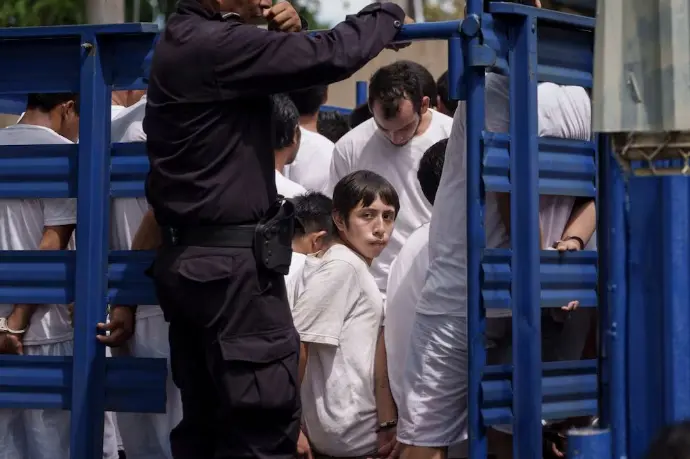The human rights situation in El Salvador's prisons
Introduction
The International Human Rights Organization has been following with deep concern and concern the events taking place inside detention centers and prisons in the Republic of El Salvador since the declaration of a state of emergency in March 2022. Serious and systematic violations have been observed affecting thousands of citizens, in conditions that do not comply with international human rights standards or regional and international legal instruments.
Summary of Documented Violations
Based on reports and investigations by independent human rights organizations, including Human Rights Watch, Cristosal, and local prison monitoring platforms, the following have been documented:
- More than 85,000 people detained without a warrant
- More than 367 deaths in prison as a result of torture or medical negligence
- Systematic practices of physical torture, including beatings, threats, and starvation
- Cases of rape in detention centers, including of women arbitrarily arrested
- Deprivation of health care and food, and the spread of skin and internal diseases
- Complicity of government officials, including Osiris Luna, in secret deals with local gangs, according to US Treasury Department reports
- Legal Framework for Conviction
These violations constitute a clear violation of:
- International Covenant on Civil and Political Rights (Articles 7, 9, and 10)
- Convention against Torture and Other Cruel, Inhuman or Degrading Treatment or Punishment
- UN Principles for the Protection of All Persons under Detention or Imprisonment
- Constitution of El Salvador The same organization that guarantees the right to a fair trial and humane treatment.
- Official Position of the Organization
The International Human Rights Organization condemns:
- The use of the state of emergency as a pretext to suspend citizens' fundamental rights.
- The generalization of punishments against individuals not affiliated with gangs, based solely on their physical appearance.
- The lack of judicial oversight over detention facilities, and the denial of journalists and observers access to prisons.
- The coverage of violations through media discourse that distorts the facts and justifies collective humiliation.
- Urgent Demands
The organization demands:
- The opening of an independent international investigation under the supervision of the Office of the United Nations High Commissioner for Human Rights.
- The immediate suspension of the state of emergency in the country and the reactivation of constitutional guarantees.
- The bringing of those responsible for violations to justice and the prohibition of political immunity.
- The granting of free access to prisons to human rights organizations and journalists.
- The financial and moral compensation of victims and their families.
Conclusion
The International Human Rights Organization renews its commitment to advocating for oppressed peoples and warns against the Salvadoran model becoming a global precedent that justifies repression in the name of security. It calls on all governments and regional and international organizations to take a firm and public stance against these violations, in order to preserve human dignity and the inalienable right to a dignified life.
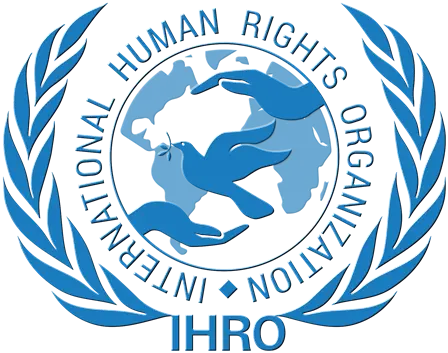
The human rights situation within El Salvador's prison system represents a major challenge. In recent years, there have been multiple complaints about precarious conditions, extreme overcrowding, and treatment that often violates the basic principles of human dignity. These problems not only impact inmates but also reflect deep structural flaws in the management and administration of prisons.
The government's approach to crime has been criticized worldwide for prioritizing heavy-handed policies that result in mass arrests and a significant increase in the prison population. Although these measures attempt to offer a decisive response to the problem of insecurity, the lack of investment in prison infrastructure and rehabilitation programs worsens the internal situation in these facilities.
Furthermore, international organizations and human rights defenders have warned of alleged systematic abuses, restrictions on access to basic services such as health and food, and a worrying lack of transparency in analyzing data related to inmate well-being. This situation highlights an urgent need for comprehensive reform, focused both on ensuring decent conditions and establishing mechanisms aimed at social reintegration.
Faced with this crisis, Salvadoran society faces the challenge of balancing citizen security with respect for fundamental rights, while the international community continues to monitor the impact of implemented policies. The search for effective solutions requires an approach that addresses not only the immediate consequences but also the root causes of the problem so that the prison system can become a space consistent with ethical and legal principles.
The human rights situation in El Salvador's prisons is a matter of deep national and international concern, especially following the implementation of the state of emergency in March 2022. Various reports from human rights organizations and international agencies have documented serious violations.
Main Complaints
- Arbitrary Detentions: More than 87,000 people have been arrested, many without warrants or clear evidence of gang involvement.
- Deaths in Custody: More than 400 deaths in prison have been reported, some with signs of torture or medical neglect.
- Incommunicado Detention and Lack of Defense: Many detainees have been denied contact with lawyers or family members, even in the case of Venezuelan migrants imprisoned without trial.
- Inhumane Conditions: Extreme overcrowding, lack of drinking water, poor medical care, and physical and psychological punishment are common.
Impact on Children and Adolescents
- Recent reforms allow minors to be imprisoned in adult prisons, violating international child protection standards.
- More than 1,000 adolescents have been sentenced under unfair trials, according to Amnesty International.
Landmark Cases
- Attorney Ruth López, a government critic, was arbitrarily transferred to a high-security prison despite health problems.
- Kilmar Abrego García, mistakenly deported, reported physical and psychological torture at the Terrorist Confinement Center (CECOT).
I. Executive Summary
This report details the serious human rights crisis that has plagued El Salvador's prisons since the implementation of the state of emergency in March 2022. While government measures have been effective in reducing gang violence, this strategy has come at a high human cost, resulting in a prison system where violations of the rights of prisoners are systematic.
The main findings for the 2022-2025 period reveal extreme prison overcrowding, with El Salvador reporting one of the highest occupancy rates in the world. This overcrowding has led to inhumane detention conditions. We have documented thousands of arbitrary detentions, in which due process and basic judicial guarantees have been suspended or ignored, leading to the incarceration of numerous people without proper legal grounds. One of the most pressing concerns is the alarming number of deaths in state custody. Many of these deaths are attributed to negligence, lack of timely medical care, or credible allegations of ill-treatment and torture. The lack of transparency in the investigations into these deaths, coupled with the lack of accountability on the part of the authorities, further exacerbates the situation.
Given this troubling reality, it is imperative that the Government of El Salvador restore constitutional guarantees and due process of law. It is crucial to urgently improve prison conditions and reduce overcrowding. It is also essential to thoroughly and impartially investigate all deaths and allegations of torture, ensuring that those responsible are held accountable. Finally, to guarantee respect for the dignity and rights of all persons deprived of liberty, independent monitoring of prisons by human rights organizations and international bodies must be permitted.
II. Introduction
El Salvador has historically been a Central American nation marked by deep social inequalities, a civil war (1980-1992), and, subsequently, a persistent and high rate of criminal violence. For decades, the country has grappled with the omnipresence and territorial control of powerful transnational gangs, such as Mara Salvatrucha (MS-13) and Barrio 18. These criminal structures were not only responsible for a high homicide rate, widespread extortion, and drug trafficking, but also exerted coercive social control over entire communities, severely limiting the freedom and security of the population. Impunity and institutional weakness contributed to perpetuating a cycle of violence that profoundly affected the social fabric and economic development of the country, also causing significant emigration.
Politically, El Salvador has seen a consolidation of executive power under the administration of President Nayib Bukele. Since his rise to power in 2019, Bukele has maintained high levels of popular approval, largely due to his rhetoric and firm actions against crime. This popularity has allowed him to consolidate a legislative majority, facilitating the passage of reforms and measures that, according to his critics, have weakened democratic checks and balances and judicial independence.
On March 27, 2022, the government of El Salvador decreed a state of emergency throughout the country in response to a sudden spike in homicides that resulted in at least 92 deaths between March 24 and 27, 2022. This extraordinary measure, which has been continuously extended as of the date of this report (July 2025), entailed the suspension of several fundamental constitutional guarantees. Among the rights affected are freedom of association and assembly, the right to be informed of the reasons for arrest, the right not to be compelled to testify, and the extension of the administrative detention period from 72 hours to 15 days.
The immediate impact of the state of emergency on public security has been undeniable and drastic. The government has reported a significant reduction in homicide rates and the eradication of extortion in many communities, generating an unprecedented sense of security for a large part of the population. The strategy has focused on mass arrests of suspected gang members and collaborators, leading to an exponential increase in the prison population.
However, this security strategy has had a profound and worrying impact on human rights. National and international organizations have documented a vast number of reports of arbitrary arrests based on profiling, anonymous informants, or mere suspicion. The suspension of due process has meant that thousands of people have been imprisoned without effective access to counsel, without knowledge of the specific charges against them, and without adequate judicial review of their detention. The scale of these detentions has exceeded the capacity of the prison system, generating alarming detention conditions.
The central objective of this report is to comprehensively analyze and document the human rights situation of persons deprived of liberty in El Salvador's prison system, from the beginning of the state of emergency in March 2022 to the present (July 2025). This analysis will focus on detention conditions, respect for due process, reports of ill-treatment and torture, and the alarming number of deaths in state custody. The report seeks to highlight the violations and their consequences, as well as provide recommendations to ensure respect for the fundamental rights of all people.
III. Legal and Regulatory Framework
The Salvadoran legal framework governing the rights of persons deprived of liberty is based primarily on the Constitution of the Republic and various criminal and procedural laws. However, the implementation of the state of emergency has significantly altered the application of these regulations.
The Constitution of the Republic of El Salvador, promulgated in 1983, is the supreme law of the country and establishes a broad catalog of fundamental rights and individual guarantees that must be respected by the State. Among the most relevant for persons deprived of liberty are:
Article 1: Recognizes the human person as the origin and purpose of the State's activity, which is organized for the achievement of justice, legal security, and the common good.
Article 2: Enshrines the right to life, physical and moral integrity, liberty, security, and property. The prohibition of torture and cruel, inhuman, or degrading treatment is implicitly protected under the right to integrity.
Article 11: Establishes that no person may be deprived of their liberty or property without being heard and defeated in a trial in accordance with the law; nor may they be tried twice for the same cause. This is the basis of due process.
Article 12: Regulates detention. It states that everyone has the right to know the reason for their detention and to be informed of their rights. It prohibits incommunicado detention for more than 72 hours and establishes that the detained person must be brought before a court within that period. It also guarantees the assistance of a lawyer from the beginning of the investigation.
Article 13: Prohibits life sentences, confiscation, and infamous punishments.
Article 14: Guarantees the right to habeas corpus, a fundamental mechanism for challenging the legality of a detention and ensuring the freedom of an arbitrarily apprehended person.
Article 29: Allows for the suspension of certain constitutional guarantees in cases of serious disturbance of public order, public calamity, or war. However, this suspension must be temporary and proportional to the situation. It is the legal basis on which the emergency regime has been implemented.
These constitutional articles, along with others, establish a robust framework for the protection of human rights in the Salvadoran criminal justice and penitentiary system
El Salvador's criminal and procedural laws, such as the Penal Code, the Code of Criminal Procedure, and the Penitentiary Law, complement the Constitution by establishing detailed procedures for investigation, prosecution, and sentencing. Before the emergency regime, these laws operated under the principles of the presumption of innocence, the right to defense, and the need for reliable evidence for conviction.
However, the emergency regime, decreed by the Legislative Assembly at the request of the Executive Branch and successively extended, has introduced substantial modifications to the application of these laws, eroding essential procedural rights and guarantees:
Suspension of the 72-hour period for administrative detention: The emergency regime allows for the detention of individuals for a much longer period (up to 15 days) before being brought before a judge, opening the door to arbitrary detention and prolonged incommunicado detention.
Restriction of the right to defense and legal assistance: Cases have been documented in which detainees lack immediate and effective access to a lawyer of their choice, or face mass proceedings where legal assistance is merely formal.
Expansion of cases of flagrancy and reduction of evidentiary standards: The arrest and prosecution of individuals has been facilitated under more lax criteria, often based on appearances, social stigmatization, or uncorroborated reports. The burden of proof appears to have fallen on the accused, reversing the principle of the presumption of innocence.
Amendments to the Penal Code: Penalties for gang-related offenses have been toughened, and new criminal offenses have been created, some with broad definitions that could criminalize non-violent behavior.
Restriction of the writ of habeas corpus: Although the Constitution guarantees this remedy, in practice, its effectiveness has been severely limited, with delays and rejections of requests for detentions under the regime.
Increase in pretrial detention: The use of pretrial detention has increased substantially, often without sufficient justification or for prolonged periods, contributing to overcrowding.
These changes, promoted under the banner of national security, have transformed the application of criminal and procedural legislation, generating an environment of legal uncertainty and a notable setback in the protection of human rights within the Salvadoran judicial and penitentiary system.
- International Instruments
El Salvador, as a member state of the international community, has ratified several human rights treaties and conventions that oblige it to respect and guarantee the fundamental rights of all persons under its jurisdiction, including those deprived of their liberty. These international instruments establish minimum standards that must be observed, even in emergency situations.
Human rights covenants and conventions ratified by El Salvador (International Covenant on Civil and Political Rights, American Convention on Human Rights, etc.)
El Salvador is a party to the main international human rights instruments, which entails binding legal commitments:
International Covenant on Civil and Political Rights (ICCPR): Ratified by El Salvador, this covenant establishes fundamental rights such as the right to life, the prohibition of torture and other cruel, inhuman, or degrading treatment or punishment (Article 7), the right to liberty and security of person, the prohibition of arbitrary detention (Article 9), the right to a fair and public trial, the presumption of innocence (Article 14), and the humane treatment of persons deprived of liberty (Article 10). Crucially, the ICCPR prohibits the derogation of certain rights, even in emergency situations, such as the prohibition of torture.
American Convention on Human Rights (ACHR) or Pact of San José: El Salvador has also ratified this regional instrument, which strengthens civil and political rights. The ACHR reiterates the right to humane treatment (Article 5), the prohibition of slavery and servitude (Article 6), the right to personal liberty (Article 7), judicial guarantees (Article 8), and the right to judicial protection (Article 25). Like the ICCPR, the ACHR establishes that the suspension of guarantees in states of emergency must be strictly necessary, proportional, and cannot affect non-derogable rights such as the prohibition of torture, the right to life, and indispensable judicial guarantees.
Convention against Torture and Other Cruel, Inhuman or Degrading Treatment or Punishment: This treaty, ratified by El Salvador, obliges States to take effective measures to prevent torture in any territory under their jurisdiction, investigate complaints, and punish those responsible. It also prohibits the return of persons to countries where they are at risk of being tortured.
Convention on the Rights of the Child: By becoming a party to this Convention, El Salvador commits to ensuring that children deprived of their liberty are treated with humanity and respect, and that their detention is only a measure of last resort and for the shortest possible period.
The United Nations Standard Minimum Rules for the Treatment of Prisoners, known as the Mandela Rules, are a set of universally accepted standards for prison management and the treatment of persons deprived of their liberty. Although not a binding treaty per se, they represent an international consensus on best practices and are a fundamental guide for States in fulfilling their human rights obligations in prison settings. Their key principles include:
Respect for inherent dignity: All persons deprived of their liberty must be treated with respect for their inherent dignity and worth as human beings.
Separation of categories of prisoners: Pretrial detainees must be separated from sentenced prisoners, and juveniles from adults.
Conditions of confinement: They establish standards for accommodation, hygiene, food, medical care, outdoor exercise, access to outside communication, and family visits.
Discipline and Sanctions: These regulate the use of force, the prohibition of cruel, inhuman, or degrading punishment, and the need for fair disciplinary procedures.
Access to Justice: These guarantee the right to lodge complaints and access legal assistance.
Health Care: These stipulate that health services in prisons must be equivalent to those available to the general community.
Inter-American Human Rights Standards on Penitentiary Matters.
In addition to global instruments, the Inter-American human rights system, through the Inter-American Commission on Human Rights (IACHR) and the Inter-American Court of Human Rights (IACHR), has developed robust jurisprudence and a series of specific principles and standards on the conditions of detention and the treatment of persons deprived of liberty. These standards, which El Salvador is obligated to observe as a party to the ACHR, include:
Principle of non-discrimination: Prohibits any differential treatment based on origin, race, gender, sexual orientation, religion, political opinion, etc.
Guarantee of physical, psychological, and moral integrity: Reiterates the absolute prohibition of torture and ill-treatment, and the State's obligation to prevent and punish it.
Material conditions of detention: The IACHR and the Inter-American Court have established that chronic overcrowding, lack of hygiene, inadequate nutrition, and poor medical care constitute cruel, inhuman, or degrading treatment.
Right to life: The State has the duty to guarantee the lives of persons in its custody, which implies preventing deaths due to negligence or violence.
Access to justice and effective remedies: Detained persons must have access to mechanisms to challenge the legality of their detention and report violations of their rights.
Judicial Oversight of Detention: The Inter-American Court of Human Rights has emphasized the need for effective and timely judicial oversight of detentions.
Together, these international instruments and regional standards constitute a legal framework that underscores El Salvador's obligation to guarantee the human rights of persons deprived of liberty, including in the context of a state of emergency, and to ensure that security measures do not undermine fundamental rights.
IV. Main Findings: Human Rights Violations in the Penitentiary System
A. Arbitrary Detentions and Due Process Violations
The implementation of the state of emergency in El Salvador has triggered a series of flagrant human rights violations, particularly with regard to detentions and due process. These extraordinary measures have allowed authorities unprecedented leeway, often at the expense of fundamental legal guarantees.
Since March 2022, the Salvadoran government has carried out an unprecedented campaign of mass arrests. Official figures and those from human rights organizations reveal the magnitude of this policy: it is estimated that more than 73,000 people were detained by November 2023. This number has continued to rise, exceeding 85,000 arrests by March 2025. The accelerated pace of these arrests, often without clear court orders or solid grounds, has generated a prison overcrowding crisis and exposed the arbitrariness of many arrests.
Suspension of Constitutional Guarantees: The state of emergency has led to the suspension of key constitutional rights, drastically altering the legal framework for detentions. Among the most affected guarantees are:
- Right to defense: Thousands of people have been detained without immediate access to a lawyer, or with ineffective and limited legal assistance during the early stages of the process.
- Right to information about detention: Detainees are often not informed of the specific reasons for their arrest or the charges against them, preventing them from providing an adequate defense.
- Administrative detention period: The maximum administrative detention period has been extended from 72 hours to 15 days, allowing authorities to detain individuals for extended periods without timely judicial intervention or review.
Lack of Evidence and Presumption of Innocence:
A central concern has been the widespread lack of evidence to support detentions. Numerous reports indicate arrests based on:
- Physical appearance: People with tattoos, specific clothing, or characteristics mistakenly associated with gangs have been detained without further evidence.
- Alleged associations: Accusations based on rumors, statements from anonymous informants, or mere suspicions of gang ties, without judicial corroboration.
- Criminalization of Poverty: Residents of communities stigmatized by the historical presence of gangs have been arrested indiscriminately, without any individual connection to criminal activity.
These practices have undermined the principle of the presumption of innocence, reversing the burden of proof and forcing detainees to prove their innocence.
Ineffectiveness of the Habeas Corpus Appeal:
Despite being a fundamental constitutional mechanism for the protection of individual liberty, the habeas corpus appeal has proven largely ineffective under the state of emergency. Human rights organizations have reported an overwhelming number of habeas corpus requests that have not been resolved in a timely manner or have been rejected without a substantive review of the legality of the detention. This ineffectiveness has left thousands of people in a state of prolonged defenselessness.
Mass Hearings Without Fairness:
The collapse of the judicial system in the face of the avalanche of arrests has been manifested in the holding of mass hearings, where hundreds of detainees are prosecuted simultaneously. In these hearings, the following have been reported:
- Lack of effective access to defense attorneys: A single public defender may be responsible for representing dozens or even hundreds of defendants, making an individualized and effective defense impossible.
- Short time to present evidence: Defense attorneys have extremely limited time to refute accusations, which are often generic and lack individualized specificity.
- Lack of knowledge of the charges: Many detainees appear at these hearings without even knowing the details of the charges against them, which seriously violates their right to a fair trial.
These collective and accelerated practices have stripped judicial processes of their most basic guarantees, turning them into mere formalities and consolidating an expedited justice system that prioritizes speed over fairness and respect for due process.
B. Prison Overcrowding and Inhumane Detention Conditions
The policy of mass detentions under the state of emergency has caused a collapse in the Salvadoran prison system, leading to unprecedented levels of overcrowding and the proliferation of detention conditions that are described as cruel, inhuman, or degrading, in clear violation of international standards.
El Salvador now has one of the highest incarceration rates in the world, and overcrowding in its prisons is critical. Recent data indicates that the prison system is operating at an occupancy rate exceeding 369.5% of its original capacity. This means that facilities designed for a given number of inmates are housing almost four times that number. This extreme level of overcrowding turns prisons into high-risk environments for the lives and dignity of those deprived of their liberty.
The direct impact of overcrowding translates into deplorable material conditions of detention:
- Inadequate Space and Furniture: Overcrowding has virtually eliminated personal space. Inmates often sleep on the floor, in hallways, or in shifts due to the lack of adequate bunk beds. When they exist, bunk beds are insufficient or in poor condition, and the lack of mattresses or sheets is a recurring complaint, forcing inmates to sleep directly on metal or cement structures.
- Ventilation and Light: Cells and common areas often lack adequate ventilation, creating stifling environments conducive to the spread of disease. Artificial lighting, in many cases, is constantly on 24 hours a day, disrupting inmates' sleep and rest cycles.
- Limited Access to Basic Services: Access to drinking water is precarious and irregular, with frequent rationing that prevents basic personal hygiene and adequate drinking water. Sanitary facilities are insufficient for the number of people, with collapsed or poorly maintained toilets, creating unsanitary conditions. The lack of basic personal hygiene products such as soap, toothpaste, or toilet paper is a constant.
The Terrorism Confinement Center (CECOT), the mega-prison opened in 2023, was designed to hold tens of thousands of inmates and symbolizes the new prison policy. However, descriptions of its detention conditions, often obtained through family members or third-party reports, raise serious concerns:
- Four-Tier Bunk Cells: Cells are designed to maximize capacity, with bunk beds stacked four tiers high, often without mattresses.
- Constant Lighting and Supervision: Inmates are under constant artificial light and are monitored nonstop by cameras and guards, eliminating any privacy and affecting their mental health.
- Severe Restrictions on Movement: Inmates have been reported to remain in their cells most of the time, with barely 30 minutes a day for physical activity or "reflection" outside their cells. This extreme restriction of movement and lack of external stimulation amount to prolonged solitary confinement, with serious implications for physical and mental health.
Overcrowded conditions and a lack of basic services have a devastating impact on inmates' health:
- Risk of Infectious Diseases: Overcrowding, poor ventilation, and poor hygiene provide a breeding ground for the rapid spread of infectious diseases such as tuberculosis, respiratory illnesses, skin infections, and gastrointestinal diseases.
- Poor Access to Medical Care and Medication: Medical services within prisons are notoriously inadequate. There is a critical shortage of medical personnel, basic medications, and equipment. Medical screenings are limited, and inmates with chronic illnesses or serious conditions often do not receive necessary treatment or medications, putting their lives at risk. Lack of timely and adequate care has been an underlying cause of many deaths in state custody.
Taken together, prison overcrowding and the material conditions described not only violate the fundamental rights to dignity, physical integrity, and health, but may also constitute cruel, inhuman, or degrading treatment, and even torture, according to international human rights standards.
C. Ill-treatment, torture, and deaths in state custody
The state of emergency in El Salvador has been characterized by a worrying increase in reports of ill-treatment, torture, and a high number of deaths of people in state custody. These situations reflect a serious erosion of the right to personal integrity and life, with an alarming lack of accountability.
Human rights organizations and testimonies from family members and former detainees have documented a persistent pattern of ill-treatment and torture inside detention centers and prisons. Reports include:
- Systematic beatings: Excessive use of physical force by prison and security officers has been reported, including beatings, hitting with blunt objects, and kicking, often as a method of "discipline" or to extract confessions.
- Humiliation and Degrading Treatment: Testimonies describe acts of degrading treatment, such as forcing detainees to remain in uncomfortable positions for prolonged periods, sleep deprivation, exposure to extreme temperatures, and the intentional denial of food or water.
- Conditions equivalent to torture: The combination of extreme overcrowding, poor hygiene, prolonged isolation, and sensory deprivation in some cases, especially at the CECOT (Center for the Protection of Human Rights), has been described by experts as conditions that, due to their intensity and duration, may constitute torture or cruel, inhuman, and degrading treatment.
- Threats and coercion: Reports of threats against detainees or their families to intimidate or force them to incriminate themselves or to testify against others.
The number of people who have lost their lives while in the custody of the Salvadoran State during the state of emergency is alarming. Various sources have documented a steady increase:
As of the end of 2023, various organizations estimated between 189 and 200 deaths of people deprived of their liberty under the security policy.
By May 2025, a consortium of human rights NGOs warned that the number of deaths in custody had already exceeded 415 people, representing an average of several deaths per week since the start of the regime.
These figures are a critical indicator of the severity of prison conditions and the lack of safeguards for inmates' lives.
The reported causes of these deaths are varied, but often point to negligence, lack of care, and poor conditions:
- Untreated illnesses or medical negligence: A large proportion of deaths are attributed to chronic illnesses (diabetes, hypertension), respiratory infections (pneumonia, tuberculosis), or acute illnesses that did not receive timely or adequate medical care. Shortages of medical personnel, medications, and the refusal to transfer inmates to outside hospitals are recurring factors.
- Beatings and injuries: There are reports of deaths resulting from beatings or injuries sustained during detention or within prisons, suggesting possible excessive use of force or torture.
- Malnutrition or severe dehydration: Inadequate nutrition and access to drinking water can contribute to health deterioration and, in extreme cases, death.
- Suicides: Although to a lesser extent, cases of suicide have also been reported, which could indicate the extreme psychological stress and precarious mental health conditions of confinement.
One of the greatest concerns is the absence of thorough, impartial, and transparent investigations into these deaths and allegations of abuse.
- Impunity: Human rights organizations have reported that, in most cases, individual accountability has not been established, nor have judicial proceedings been opened against officials allegedly involved in abuse or negligence.
- Lack of Access to Information: Relatives of the deceased often face enormous obstacles in obtaining information about the circumstances of their loved ones' deaths, the results of autopsies, or the status of investigations.
- Government Denial: The Salvadoran government, through its officials, has consistently denied the existence of torture in prisons and has attributed most deaths to natural causes or preexisting illnesses, without providing conclusive evidence to refute the allegations. This lack of recognition and closing of ranks greatly hinder accountability and justice for victims and their families.
The persistence of these violations underscores the urgent need for international intervention and monitoring, as well as a renewed commitment by the Salvadoran State to protecting the human rights of all persons in its custody.
D. Violation of the Rights of Specific Populations
The impact of the state of emergency has been disproportionate and particularly devastating for certain vulnerable populations within the Salvadoran penal and penitentiary system. These groups, who already faced greater risks of discrimination and exclusion, have seen their fundamental rights severely violated.
Despite national and international regulations requiring differentiated and specialized treatment for minors, worrying cases of adolescent transfer to adult prisons have been documented. This practice violates fundamental principles of juvenile justice and has a severe impact on their development and rights:
- Risk of Abuse and Exploitation: Intermingling with adult populations, often more experienced in crime, exposes minors to a greater risk of violence, sexual abuse, and co-optation by criminal organizations.
- Psychological and Emotional Impact: Confinement in conditions inappropriate for their age, coupled with the lack of specific educational, recreational, or rehabilitation programs for adolescents, has a devastating impact on their mental health and overall development.
- Violation of International Standards: The detention of minors should be a measure of last resort and for the shortest possible time, in specialized centers that guarantee their protection and rehabilitation, principles that are seriously compromised by their confinement in adult prisons.
The tightening of security policies has also affected people on the move. There have been reports of detention of migrants, including those transiting through the country or in the process of returning, in maximum-security prisons alongside those accused of serious crimes.
- Criminalization of Migration: This practice blurs the line between irregular migration and criminal activity, subjecting people seeking refuge or better living conditions to prison regimes designed for dangerous criminals.
- Access to International Protection: Detention in regular prisons makes it difficult for migrants and asylum seekers to access information about their rights, contact consulates, or request international protection, leaving them extremely vulnerable.
The general conditions of the prison system are already inadequate, but for people with disabilities and those with chronic illnesses, the barriers to accessing specialized care are even greater:
- Lack of Accessible Infrastructure: Prison facilities lack ramps, adapted bathrooms, and other necessary accommodations for people with physical disabilities.
- Aggravated Medical Neglect: If general medical care is deficient, access to specialists, specific medications, and ongoing treatment for conditions such as diabetes, hypertension, HIV/AIDS, or mental disorders is almost nonexistent, worsening their health and putting their lives at risk.
- Isolation and Discrimination: These people may face further isolation and stigmatization within prisons, which deteriorates their physical and mental well-being.
The impact of the state of emergency extends beyond the prison walls, profoundly affecting the families of detainees, who suffer a triple burden:
- Psychological and Emotional Suffering: Uncertainty about the whereabouts and situation of their loved ones, lack of communication, and news of abuse generate anguish, post-traumatic stress, and profound pain.
- Social and Economic Stigmatization: Families of those accused of gang membership are often stigmatized by society and may face financial hardship due to the loss of their primary provider or incurring expenses in searching for and defending their relatives.
- Critical Lack of Information: One of the greatest challenges is the lack of official and transparent information about the status, whereabouts, or even the lives of detainees. Families search desperately among different centers and facilities, with little or no response from the authorities, which prevents them from exercising their right to the truth and, in the event of death, their right to a dignified grieve.
- Orphaned Children's Numbers: The death of parents in custody has left hundreds of children orphaned. It has been reported that more than 170 children were orphaned due to the death of their parents in prisons under the emergency regime. This is a social tragedy with long-term consequences for the development and well-being of these minors, who are left without the support and care of their parents.
The violation of the rights of these specific populations underscores the need for a differentiated approach and the implementation of urgent measures to protect the most disadvantaged within the context of the emergency regime.
V. Position and Arguments of the Salvadoran Government
The Salvadoran government's response to allegations of human rights violations in the context of the state of emergency has been consistent in its defense of its security policy and its denial of most of the accusations.
Since the beginning of the state of emergency, government officials, including President Nayib Bukele, security ministers, and prison directors, have categorically denied the existence of torture and ill-treatment within Salvadoran prisons. Their statements often focus on the idea that human rights are respected and that the allegations are part of a smear campaign orchestrated by "front organizations" or opposing political actors. They argue that the treatment of detainees is what those who have terrorized the population "deserve," dismissing concerns about human dignity and international standards. They have repeatedly claimed that prison deaths are due to pre-existing conditions or natural causes, without offering conclusive evidence to refute reports of neglect or violence.
The government's official narrative justifies the State of Emergency as a necessary and indispensable measure to guarantee public safety and effectively combat gangs. The discourse focuses on the "war on gangs" as a legitimate effort to eradicate a threat that has kept Salvadoran society under a yoke of violence and extortion for decades. The main arguments for its justification include:
- Peace and Tranquility: The regime is presented as a means to restore peace and tranquility to citizens, freeing them from the territorial control of gangs.
- Popular Will: The government often invokes the broad popular support this measure has received as proof of its legitimacy and success, arguing that the majority of Salvadorans prioritize security over concerns for the human rights of suspected criminals.
- Exceptional Threat: It is argued that the threat posed by gangs is of such magnitude that it requires extraordinary measures, even if they involve the temporary suspension of certain safeguards.
One of the fundamental pillars of the government's argument for defending the state of emergency is the drastic reduction in the rate of criminal violence, particularly homicides. Before the regime, El Salvador was one of the most violent countries in the world. The government has presented figures showing a historic drop in the number of murders, directly attributing this achievement to mass arrests and the "iron fist" policies implemented.
While in previous years the homicide rate was alarmingly high, official statistics have reported an unprecedented decline, with days and even entire months without homicides.
These figures are constantly highlighted by the President and other officials as irrefutable proof of the effectiveness and success of their security strategy, arguing that the improvement in daily life for millions of Salvadorans justifies the measures taken. For the government, the security achieved prevails over criticisms related to human rights.
In short, the government's position is based on the denial of systematic abuses and the firm justification of its policies as the only way to achieve peace, supported by the evident and celebrated reduction in criminal violence in the country.
VI. Recommendations
To address the serious human rights situation in El Salvador's prisons, and in line with the State's international obligations, the following urgent recommendations are made to the Salvadoran Government:
Unrestricted Respect for Due Process and Judicial Guarantees: It is essential that full respect for the Constitution and international treaties be guaranteed at every stage of the criminal process. This includes the right to the presumption of innocence, immediate and effective access to counsel of one's choice, the right to be informed of the charges, and the right to a timely presentation before a judge.
- Urgent Review of Arbitrary Detentions and Releases: An expeditious individual judicial review of all detentions carried out under the state of emergency should be conducted. Those who have been detained without sufficient evidence or due process should be released immediately and, if appropriate, compensated for any damages suffered.
- Improving Prison Conditions and Immediate Reduction of Overcrowding: Urgent measures must be taken to discourage mass detentions and, at the same time, implement effective solutions to reduce the alarming overcrowding in all prisons. This involves considering alternatives to imprisonment for minor offenses and expediting judicial proceedings for those who qualify.
- Guarantee Access to Health Care, Water, and Sanitation: The State must ensure that all persons deprived of their liberty have dignified and continuous access to basic services. This includes a constant supply of drinking water, adequate and functional sanitation facilities, personal hygiene products, and preventive and curative medical care equivalent to that available to the general population, including access to medication and hospital transfers when necessary.
- Thorough and Impartial Investigation of Deaths and Allegations of Torture: Prompt, thorough, impartial, and transparent investigations must be initiated ex officio into all deaths occurring in state custody, as well as into every allegation of torture or ill-treatment. These investigations must be conducted by independent bodies with the necessary resources.
- Accountability for Violations Committed: Investigations must lead to the identification and punishment of those responsible for any human rights violations, both materially and through actions or omissions within the chain of command. Impunity perpetuates abuses and undermines confidence in the justice system.
- Restoration of Suspended Constitutional Rights: Given the apparent stabilization of the security situation, the government is urged to review and, ultimately, lift the suspensions of constitutional guarantees. This would allow for the full restoration of the rule of law and the protection of the fundamental rights of all citizens.
- Allow Independent Monitoring of Prisons: National and international human rights organizations, as well as intergovernmental bodies, must be authorized unrestricted and unannounced access to all prisons and detention centers. This external monitoring is crucial for verifying conditions, documenting abuses, and offering impartial recommendations.
The international community has a crucial role in the protection of human rights in El Salvador, particularly in a context where fundamental guarantees have been severely restricted. The following recommendations seek to guide its action:
- Maintain pressure and monitor the human rights situation in El Salvador: It is vital that regional and international organizations (such as the IACHR, the OAS, the UN, and their specialized rapporteurships) continue to document, denounce, and highlight human rights violations. This includes issuing communiqués, periodic reports, and conducting visits (if permitted) to El Salvador. Sustained diplomatic pressure is essential to remind the State of its international obligations.
- Offer technical assistance and cooperation for reforming the prison system in line with international standards: Instead of merely criticizing, the international community can proactively offer resources, expertise, and training. This includes technical assistance programs to improve prison conditions, implementing internal and external monitoring systems, training prison staff in human rights, and supporting legal reforms that restore due process and judicial guarantees. This cooperation should be conditioned on the genuine willingness of the Salvadoran government to implement significant changes.
- Consider diplomatic and economic measures if violations persist: If, despite pressure and offers of cooperation, human rights violations persist and there is no political will to rectify the situation, the international community should consider implementing more forceful measures. These could include:
- Travel restrictions for officials responsible for abuses.
- Freezing the assets of individuals implicated in serious violations.
- Reviewing financial cooperation or aid programs not directly linked to essential humanitarian needs, making them conditional on compliance with human rights standards.
- Calls to the International Criminal Court to investigate international crimes, if circumstances warrant and jurisdictional criteria are met.
These actions seek to ensure that El Salvador fulfills its international commitments and that the human rights of all people, including those deprived of liberty, are fully respected.
VII. Conclusion
The human rights situation in El Salvador's prisons, under the prolonged state of emergency, is extremely serious and requires urgent and immediate attention. The findings presented in this report, which include critical overcrowding, inhumane detention conditions, mass arbitrary arrests, ineffective due process, and the alarming number of deaths in state custody, not only contravene national legislation but also flagrantly violate El Salvador's international human rights obligations.
While the Salvadoran government has made significant progress in reducing gang violence, a legitimate and desirable goal for any State, human dignity and fundamental rights cannot and should not be sacrificed for the sake of security. It is essential that El Salvador strike a balance between public security and unrestricted respect for human rights. International experience demonstrates that sustainable and lasting security is built on the foundations of the rule of law, justice, and respect for individual freedoms, not at their expense. The current strategy, although successful in its stated objectives, risks creating a legacy of abuse, injustice, and a vulnerable prison population, with long-term social and humanitarian consequences that will undermine any perceived short-term benefits.
It is imperative that the Salvadoran authorities recognize the magnitude of this humanitarian crisis within their prisons and take urgent corrective measures to align their practices with international standards and their own Constitution. The international community, for its part, must maintain active vigilance and offer cooperation to ensure that the search for safety does not become a pretext for the systematic violation of the most basic rights. The lives and dignity of thousands of people depend on it.

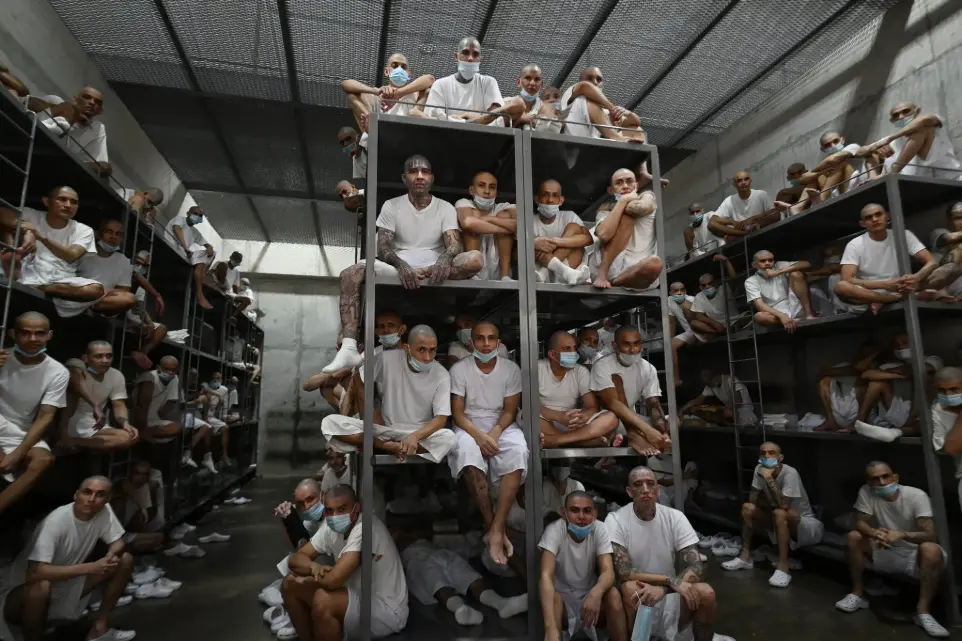
How do prison conditions in El Salvador compare with other countries?
Prison conditions in El Salvador are among the most critical in the world, especially since the implementation of the state of emergency in 2022. Here's a comparison with other countries:
Country | Incarceration rate | Overcrowding | Conditions reported |
El Salvador | +2.5% of the adult population | Up to 350% | Torture, lack of medical care, isolation |
Brazil | ~0.3% | ~150% | Violence among inmates, corruption, overcrowding |
Argentina | ~255 prisoners per 100,000 inhabitants | ~22.1% | Overcrowding, lack of staff |
USA | ~0.7% | Variable | Prolonged isolation, unequal access to health |
Norway | ~0.07% | There is no overcrowding | Focus on rehabilitation, decent conditions |
Mexico | ~0.2% | ~130% | Internal extortion, lack of basic services |
What distinguishes El Salvador
- Permanent regime of exception: Suspension of constitutional guarantees such as the right to defense and a fair trial.
- CECOT as a symbol: The Terrorism Confinement Center houses more than 14,000 people in conditions denounced as inhumane.
- Extremely high mortality: More than 390 deaths in custody since 2022.
- Prison migration agreements: El Salvador receives migrants deported by the US accused of gang membership, worsening prison overcrowding.
In contrast
- Nordic countries like Norway prioritize social reintegration, with individual cells, access to education, and family contact.
- The US, despite its high prison population, maintains minimum standards of health and legal defense, albeit with problems of isolation and structural racism.
The Universal Declaration of Human Rights (UDHR), adopted by the UN in 1948, establishes fundamental principles that must apply even in contexts of deprivation of liberty. Although it does not directly mention prisons, several articles are essential to protecting the dignity of incarcerated persons:
Key Articles Applicable to Prison / Article Principle Prison Relevance
- Art. 1 Dignity and Equality
Every person, even when deprived of liberty, retains his or her dignity.
- Art. 3 Right to Life, Liberty, and Security
Prohibits physical and psychological abuse in prison.
- Art. 5 Prohibition of Torture
Condemns cruel, inhuman, or degrading treatment.
- Art. 9 Protection from Arbitrary Detention
Requires fair legal proceedings before imprisonment.
- Art. 10 Fair Trial
Right to a hearing by an impartial tribunal.
- Art. 11 Presumption of Innocence
Protects persons in pretrial detention.
Practical Implications
- Prisons must respect human dignity, not be spaces of dehumanizing punishment.
- Overcrowding, torture, isolation, and lack of medical care violate these principles.
- The UDHR serves as the basis for more specific treaties such as the UN Mandela Rules and the Convention against Torture.
In the context of El Salvador,
The situation in centers like the CECOT has been criticized for violating several articles of the UDHR, especially 5 and 9, due to allegations of torture, detention without trial, and inhumane conditions.

 IHRO NEWS
IHRO NEWS